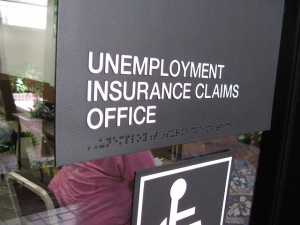The Long-Term Unemployed In NJ Face Catch-22 Situation
due no later than ____[check
with Professor for due date]
via
typed/doublespaced hard copy
Extra credit points
possible =
from 0-12
points.
If your score on this analysis is higher than your lowest
BLACKBOARD
quiz percentage/score it will replace
that low score. If not, your score
on this analysis will be averaged in to the overall
Attendance, Participation,
add'l Assignments
portion of your semester grade.
Carefully
read the news article below. If
you want you can also conduct your own research to seek out as much of the
original research or other online postings that you can find.
Write 2-3 paragraphs in which you discuss:
As has
been done several times in class, the
details in this article allow you to trace the progressive linkages among
IPT / STEREOTYPING / PREJUDICE / BIAS.
If is also possible to start at the end with
"Bias" & trace backwards. Either way you will need to include:
►(1)
explanations of the 4 separate terms,
►(2)
the underlying human dynamic category, and
►(3)
discussion of the specific aspects of the
article that match up with each of the 4 terms.
===================================
The Long-Term Unemployed In NJ Face
Catch-22 Situation
After the Great Recession began back in 2008,
many folks who lost their
jobs
have never been able to find new ones.

Flickr User Burt Lum
The number of
long-term unemployed
people in Jersey and across the country – who have been looking for work for
more than 6 months – has consistently topped 40 percent since 2009.
New Jersey is the first state in the nation to pass legislation that bans
discrimination of the long-term unemployed who are seeking job opportunities
– but many experts believe the problem still exists here.
Lewis Maltby, President of the National Workrights Institute in
Princeton, says “not hiring people because they’ve been unemployed for a
long time is really unfair and totally crazy – but I could see why some
employers would do it -employers are very risk averse – the worst thing you
can do is hire an employee who doesn’t work out – so they could be thinking
– maybe the reason this person has been unemployed for a year because
they’re not a very good employee – maybe that’s why they haven’t gotten a
job yet.”
He says they’ll decide “let’s play it safe and hire the guy who’s only
been out of work for a month- that’s the kind of thinking that goes on…it’s
completely unfair – what could be more unfair than saying – you’re out of
work so you need to get a job- but you can’t get a job because you’re out of
work – it’s the ultimate catch 22.”
Maltby adds if an employer looks at somebody’s work record and doesn’t
think they’ve been a very good employee in the past – they shouldn’t have to
hire them, “but you shouldn’t refuse to hire somebody just because they’ve
been unemployed for a long time- if you’re a good employer, do your homework
and evaluate the person’s past performance and make a decision.”
He also points out “there’s no way of knowing how often it happens
because it’s not an official company policy- no company is going to pass an
official policy that says we won’t hire anybody who been unemployed for a
year – it’s just going to be something they’re going to do without talking
about it.”
More than a other dozen states – from Connecticut to California – are now
considering anti-bias unemployment legislation similar to the law now in
effect in the Garden state.

